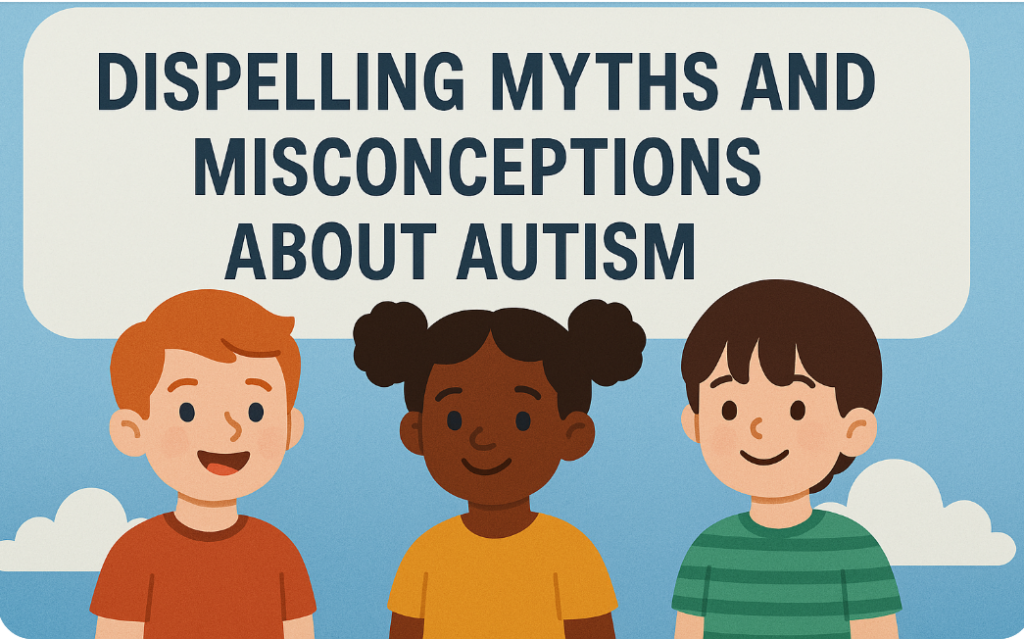Photo credit: Freepik
Despite the growing awareness of autism, people still have preconceived ideas about it, particularly in Black communities where stigma, lack of awareness, and disparities in healthcare access create barriers to diagnosis and support.
Many autistic individuals still experience rejection and discrimination in society due to pervasive and harmful stereotypes and misconceptions about their personhood.
These misconceptions are sometimes shaped by the media. For example, some movies and literature focus on portraying autistic individuals with extraordinary abilities. This can create unrealistic expectations and reinforce the misconception that all autistic individuals possess such talents.
A parent of an autistic child once mentioned his frustration with people always assuming his daughter has some sort of “superpowers” because of her ability to see and sense things others don’t.
But the truth is, autism is far more diverse than these portrayals suggest. Each autistic individual is unique, with varying cognitive abilities and personal traits. Not everyone on the spectrum may exhibit extraordinary and exceptional mental abilities, as they have their unique traits.
What is Autism and Why is it Called a Spectrum?
The National Institute of Mental Health defines Autism Spectrum Disorder (ASD) as a neurological and developmental disorder that affects how people interact with others, communicate, learn, and behave. Although autism can be diagnosed at any age, it is described as a “developmental disorder” because symptoms generally appear in the first two years of life.
Autism can be diagnosed in people of all ages, cultural backgrounds, and economic status in varying ways, with symptoms ranging from mild to severe.
A study published in Autism Research shows that about 100 in 10,000 (or 1 in 100) children around the world are diagnosed with ASD.
As of 2024, autism affects 1 in 36 children in the US alone, according to the Centers for Disease Control and Prevention. In the U.S., autism prevalence is lower among white children than among other racial and ethnic groups. White children have a 2.4% prevalence, while Black and Hispanic children show higher rates at 2.9% and 3.2%, respectively.

Autism is often described as a spectrum, and for good reason. This is because everybody with autism is different. Though they can share certain characteristics, people with ASD may not have all of the same symptoms.
For instance, one person may struggle with verbal communication, while another is highly articulate but finds non-verbal cues like body language confusing. While someone might be high-functioning and need little or no support, another person may be low-functioning and need constant care from a parent or guardian.
The Most Common Myths and Misconceptions About Autism Spectrum Disorder
For a long time, the narrative surrounding autism has been dominated by misconceptions, particularly within Black communities. The stigmatization and rejection of autistic individuals in society are mostly because of these myths and misconceptions.
In observance of Autism Acceptance Month this April, it is important that we challenge our preconceived notions and unlearn harmful myths about autism as we begin to embrace the truth.
Thanks to increasing awareness and research, we are learning a lot more about autism than ever before. But there is still a lot we don’t know. In 2025, we are moving beyond these outdated and harmful stereotypes, dismantling these myths, and celebrating the richness of neurodiversity. How do we achieve this? By providing clarity on this often misunderstood condition. We need to ensure that we and those around us are properly educated as to what is and isn’t true about autism.
Here are some of the most common myths and misconceptions about autism that have been out there, with an explanation of the real truth.
Myth: Autism is a Disease and Can Be Cured
One common misconception among the myths about autism is that it is a disease. Some people think that people with ASD can be cured with medicine and treatment like an ill person, leading them to assume that autistic people are, therefore, “sick”.
The truth is that being autistic does not mean you have an illness or disease. Your brain just works differently from other people’s. Autism is not a disease that can be cured with medicine, and autistic people are definitely not ill. The word “cured” doesn’t even factor into the discussion! They may take medication to help with health issues or minimize related symptoms like depression, anxiety, seizures, and focus problems, but this is a treatment and not a cure.
Myth: Autistic Individuals Don’t Like to be Social
Just because some people with autism have difficulty making friends and often keep to themselves, many assume that all autistic individuals don’t like to be social.
The truth is that autistic folks have just as much of a need for socialization as anyone else. They may navigate the world and social interactions in a different way, but this doesn’t mean they don’t have social skills or can’t handle interacting with other people. They may just need some additional social skills development support.
Myth: ASD is Caused by Vaccines
Despite extensive research to the contrary, some still believe that vaccines cause autism. This myth dates back to the 1990s following a research study that claimed vaccines, specifically the MMR vaccine, were linked with autism. The research has since been debunked.
The exact cause(s) of autism remains unknown. But one thing’s for certain: It’s not a result of vaccines. The Institute of Medicine’s Immunization Safety Review Committee released a report in 2004 that addressed the purported link between vaccines and autism. It concluded that there was no substantiated evidence supporting a connection between vaccines and autism.
Myth: If Your Child is Autistic, It’s Probably Due to Bad Parenting
As much as nobody knows what causes autism, or if it has a cause, some people have been blaming bad parenting or emotional neglect for this condition.
The truth is that parents don’t make their children autistic. People with ASD can come from all different types of parents with various parenting styles. While varying parenting styles can affect mental health, they cannot create a developmental condition like autism.
Research has consistently debunked this idea as nothing more than a harmful myth and shown that parenting style has no causative link to Autism. This blame game is unhelpful and unfair to both individuals with ASD and the parents striving to support them.
All People with ASD also have Intellectual Disabilities
This is another harmful misconception people have about autism. It is noteworthy that Intellectual disabilities and ASD are not the same. Though intellectual disabilities are common in individuals with ASD, not everyone with ASD has an intellectual disability, and not everyone with an intellectual disability has ASD.
Most people living with ASD do not have severe intellectual disabilities and can function relatively normally within society. According to the CDC, around 31% of individuals with autism have an intellectual disability, but the majority have average to above-average intelligence.
Myth: Autism Can be Cured
This is another myth that needs to be debunked. There is no “cure” for Autism, nor is it a disease that needs to be cured. Professional assistance can help provide the building blocks for social and communication skills to people with autism, but it does not provide them with a cure.

Myth: People with Autism are Violent or Aggressive
Media reports relating autism to violence have contributed to the public’s perception that individuals with autism act violently. The perpetrators of the mass murders at Sandy Hook Elementary School in 2012, Isla Vista-Santa Barbara in 2014, and Umpqua Community College in Oregon were all described as having features of autism.
There is no evidence to suggest that individuals with autism are inherently violent or dangerous. Like any other group of people, their behavior can be influenced by various factors such as communication difficulties, sensory overload, or frustration due to unmet needs. In fact, research indicates that autistic individuals with autism are more likely to be victims of violence than perpetrators.
Myth: People with Autism are Highly Intelligent; They are all Geniuses
There is a widespread belief that every person with ASD is endowed with extraordinary intellectual capabilities or is meant to be a genius in one specific area. This stereotype has been perpetuated by movies, television shows, and literature, which often portray autistic characters as having special or “savant” skills, a very rare condition in which someone exhibits extraordinary and exceptional mental abilities.
The truth is that many autistic people have amazing talents and skills in certain areas, but not everyone with autism is a genius or possesses savant skills. It is estimated that 1 in 10 people with ASD show savant skills. Even people with savant syndrome tend only to display far-above-average skills in one specific area. While some may have particular gifts in art, science, or mathematics, they may still struggle with basic things like tying their shoelaces.
In 2025 and beyond, we must ensure we spread the word about what autism is and isn’t. Rather than promoting and spreading these potentially harmful stereotypes, we need to recognize and celebrate the diversity of experiences and talents within the autism community.
Not only are these misconceptions about autism offensive, harmful, and stigmatizing, they are just plain misleading. We must do our best to ensure autistic people receive the support, help, and understanding they need and deserve.





